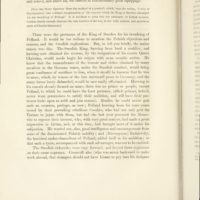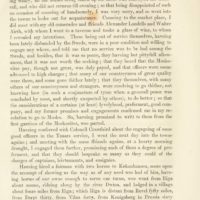![1661] DIARY OF PATRICK GORDON. 51 went the next day and complained to the Colonell 1661] DIARY OF PATRICK GORDON. 51 went the next day and complained to the Colonell](https://cdn2.picryl.com/photo/1699/12/31/1661-diary-of-patrick-gordon-51-went-the-next-day-and-complained-to-the-colonell-626008-1024.jpeg)
Related
![1661] DIARY OF PATRICK GORDON. 43 Wee rose early, and, towards eveniug, came to Kokenliausen](https://cdn2.picryl.com/thumbnail/1699/12/31/1661-diary-of-patrick-gordon-43-wee-rose-early-and-towards-eveniug-came-to-0170c2-200.jpeg)
1661] DIARY OF PATRICK GORDON. 43 Wee rose early, and, towards eveniug, came to Kokenliausen
![1661] DIARY OF PATRICK GORDON. 49 quarters, and exercized these souldiers](https://cdn2.picryl.com/thumbnail/1699/12/31/1661-diary-of-patrick-gordon-49-quarters-and-exercized-these-souldiers-e3a2af-200.jpeg)
1661] DIARY OF PATRICK GORDON. 49 quarters, and exercized these souldiers
![1654] DIARY OF PATRICK GORDON. 15 hoped to have found Duke Radzlvill](https://cdn2.picryl.com/thumbnail/1699/12/31/1654-diary-of-patrick-gordon-15-hoped-to-have-found-duke-radzlvill-e5cc52-200.jpeg)
1654] DIARY OF PATRICK GORDON. 15 hoped to have found Duke Radzlvill
![1661] DIARY OF PATRICK GORDON. 47 good earnest to consider how I might ridd myself of this countrey](https://cdn2.picryl.com/thumbnail/1699/12/31/1661-diary-of-patrick-gordon-47-good-earnest-to-consider-how-i-might-ridd-myself-8dac7f-200.jpeg)
1661] DIARY OF PATRICK GORDON. 47 good earnest to consider how I might ridd myself of this countrey
![1655] DIAEY OF PATRICK GORDON. 17 who was, according to the custome of the Polonian nobility](https://cdn2.picryl.com/thumbnail/1699/12/31/1655-diaey-of-patrick-gordon-17-who-was-according-to-the-custome-of-the-polonian-7b403f-200.jpeg)
1655] DIAEY OF PATRICK GORDON. 17 who was, according to the custome of the Polonian nobility

20 DIARY OF PATRICK GORDON. [1655 men with a gallant traine of artillery. It was a most delighttull
![1666] DIARY OF PATRICK GORDON. 63 noise, the Russes being unwilling to disoblige tbe Hollanders](https://cdn2.picryl.com/thumbnail/1699/12/31/1666-diary-of-patrick-gordon-63-noise-the-russes-being-unwilling-to-disoblige-aae600-200.jpeg)
1666] DIARY OF PATRICK GORDON. 63 noise, the Russes being unwilling to disoblige tbe Hollanders

42 DIARY OF PATRICK GORDON. [1661 misfortune
![1690] DIARY OF PATRICK GORDON. 107 their arrival was announced. Gordon was at once admitted to His Majesty](https://cdn2.picryl.com/thumbnail/1699/12/31/1690-diary-of-patrick-gordon-107-their-arrival-was-announced-gordon-was-at-a59a57-200.jpeg)
1690] DIARY OF PATRICK GORDON. 107 their arrival was announced. Gordon was at once admitted to His Majesty
1661] DIARY OF PATRICK GORDON. 51 went the next day and complained to the Colonell
Summary
Passages from the diary of General Patrick Gordon of Auchleuchries : A.D. 1635-A.D. 1699"
1661] DIARY OF PATIUCK GORDON. 51
went the next day and complained to the Colonell, who promised to take
inquisition and give satisfaction ; but I denying all, according to the fashion ^
of this countrey, where there are not witnesses, which, upon his complaint
to the Boyar, and in the office, I did also ; so that he, seeing the Boyar to
befriend me, as one lately come and unacquainted with the fashions of the
countrey, desisted from his suite, and made meanes to be gone from the
regiment, which was that I wished and aimed at.
Whilst I was here, I was at two weddings, in the Slobod of the Strangers,
the one, Ruitmaster Ryter, marryed to the -widdow of Lievetennant Collonell
Thomas ]\[enezes, who, being wounded by Czudnow, dyed there ; the other,
Captaine Lidert Lome, marryed to Bannerman, at both which I was merry,
and gott my first acquaintance with the females.
By order, I removed and quartered over the river Yausa, in the December.
Tagany and Potters Slobod, within the Earthen Wall. Here I had my
quarters in a rich merchants house, who used all meanes to gett me removed,
and brought two orders out of the court office to this purpose ; but, I being
loth to quite such a convenience, did not obey them of the stranger office.
I would not remove, and keeped the orders by me.
At this tyme ane accident did fall out, which I cannot omitt to relate.
At my removall from the Zagrodniky, a Russe liewtennant, called Peter
Nikiforuf, came to me with a Serjeant, tellino; me, that three souldiers the
night befor, in a quarrell with the Streltsees, were so beat and maimed, that
they were not able to remove with the regiment, and that without ane
underwritten petition from me, they could not be permitted to stay in their
quarters. So bringing a petition and reading it, that they might stay in
their quarters fyve or six dayes mitill they might be able to remove, which
I, suspecting no deceit, unadvisedly put my hand to it. But when I mustered
the regiment in the Taijany Slabod, these mens names being called, their
comerades answered, that they were let of to their habitations, after which
euquireing, I understood, that this lieutennant being bribed by these sojours,
had either not read the petition right, or shufled in another into my hands
10 subscrive ; for the petition I subscrived was to let of three sojours to their
houses for six weekes. These three comeing to Vologda, where their habi-
tations were, the governour apprehended them, and sent them to Mosko
with the petition ; which, thereafter, by the malice of the chauncelor, who
was my enemy, had like to have bred me Great trouble.
Gordon was brought up and remained a lifelong Roman Catholic, at a time when the Church was being persecuted in Scotland. At age of fifteen, he entered the Jesuit college at Braunsberg, East Prussia, then part of Poland. In 1661, after many years experiences as a soldier of fortune, he joined the Russian army under Tsar Aleksei I, and in 1665 was sent on a special mission to England. After his return, he distinguished himself in several wars against the Turks and Tatars in southern Russia. In recognition of his service he was promoted to major-general in 1678, was appointed to the high command at Kiev in 1679, and in 1683 was made lieutenant-general. In 1687 and 1689 he took part in expeditions against the Tatars in the Crimea, being made a full general. Later in 1689, a revolution broke out in Moscow, and with the troops under his command, Gordon virtually decided events in favor of Peter the Great against the Regent, Tsarevna Sophia Alekseyevna. Consequently, he was for the remainder of his life in high favor with the Tsar, who confided to him the command of his capital during his absence from Russia. In 1696, Gordon's design of a "moveable rampart" played a key role in helping the Russians take Azov. One of Gordon's convinced the Tsars to establish the first Roman Catholic church and school in Muscovy, of which he remained the main benefactor and headed the Catholic community in Russia until his death. For his services his second son James, brigadier of the Russian army, was created Count of the Holy Roman Empire in 1701. At the end of his life the Tsar, who had visited Gordon frequently during his illness, was with him when he died, and with his own hands closed his eyes. General Gordon left behind him a uniquely detailed diary of his life and times, written in English. This is preserved in manuscript in the Russian State Military Archive in Moscow. Passages from the Diary of General Patrick Gordon of Auchleuchries (1635–1699) was printed, under the editorship of Joseph Robertson, for the Spalding Club, at Aberdeen, Scotland, 1859.
